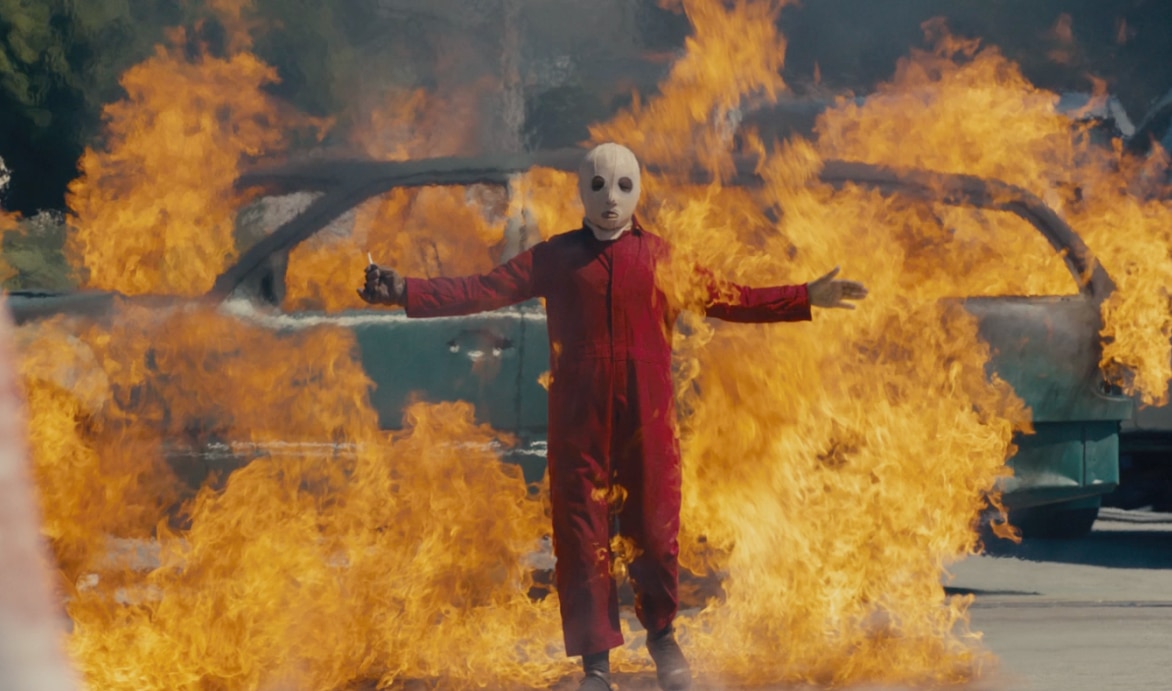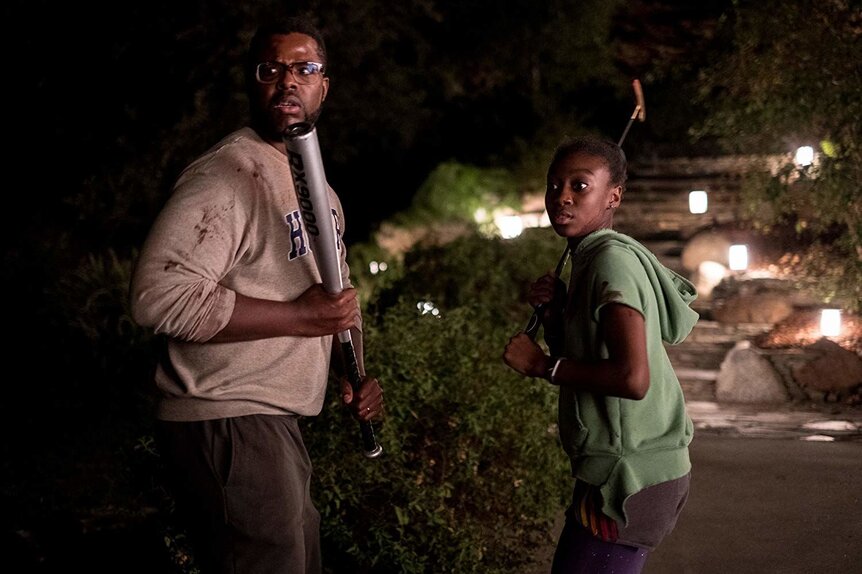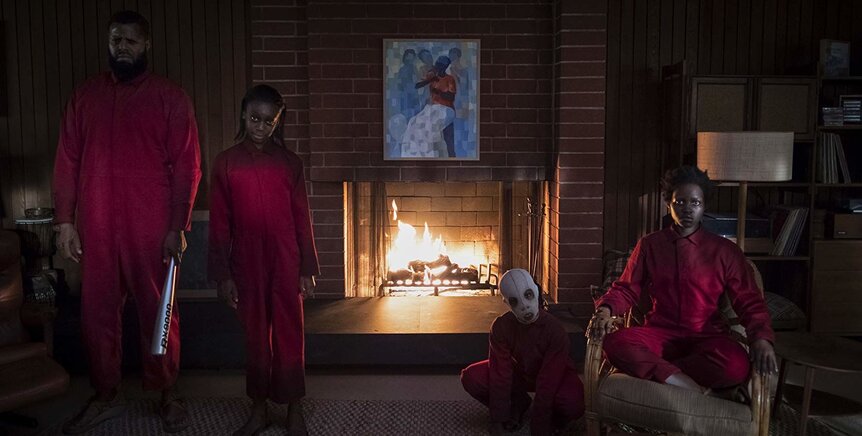Create a free profile to get unlimited access to exclusive videos, sweepstakes, and more!
Rounding up the best and hottest takes about Jordan Peele's Us

It seems like everybody and their double is talking about Us, Jordan Peele's highly anticipated follow-up to Get Out. There is a lot to unpack and discuss while talking about Us, both in terms of what the film means and what it means for the moviegoing landscape.
So, let's grab our golden scissors and cut through all the chaff for this roundup of the most important conversations people are having about Us.
**Spoiler warning**: This post contains spoilers for Us, and they'll get bigger as the article continues. So, if you haven't seen the movie yet, maybe just read the first two sections and then bail before getting to the juicy plot details.
A "SURPRISE" BOX OFFICE SMASH
Us has dominated the box office in a way that most industry insiders were not predicting. Variety reports that it brought in $70 million in its opening weekend, making it the second-biggest opening of the year after Captain Marvel. It's the best opening for an original film (as in one that's not a sequel or based on a comic or some other pre-existing material) since 2009's Avatar.
Us was initially expected to bring in just $45 million in its opening weekend, a low-ball estimate that has some writers calling bulls***. Horror is one of the last remaining genres where an original property can still reliably make an impact at the box office. And is it any shock that people were excited to see Peele's follow-up to Get Out, a movie that in all honesty should have won the Oscar for Best Picture?
"White male critics tend to assume that when [black-led films] do well, it's a surprise and a shock, as if white audiences cannot support films in which they are not the protagonists," writes The Mary Sue's Kate Gardner. "The same thing happened with Hidden Figures, Girls Trip, Black Panther, and yes, Get Out."
A WORTHY FOLLOW-UP OR SOPHOMORE SLUMP?
Moviegoers are coming out in droves to see Us, but what do the reviews say? Rotten Tomatoes shouldn't be taken as gospel when it comes to determining if a film is good or bad, but it's a pretty good barometer at a glance. As of Tuesday, Us is enjoying a 91 percent rating from critics and a 71 percent audience score.
So, clearly, people like Us. It's a thrilling, enjoyable horror movie that boasts a nifty concept, terrific acting (especially from Lupita Nyong'o, who is downright astounding) and masterful direction from Peele.
"The direction here is downright balletic, the camera jerking and swooping with a defined purpose," writes Randall Colburn of The AV Club. "Every frame bursts with detail, whether it's a thematic dovetail or a murky figure sprinting into the periphery. Us scores its most effective scares not from a stab or a shriek, but from the near-imperceptible, the nightmare lurking in the shadows."
"Every ounce of Us is a choice that speaks to the bigger picture, and Peele isn't afraid of the grotesque; finally, a movie splatters blood across a pristine, white Alexa," writes Polygon's Matt Patches in a glowing review.
How does Us fare as a follow-up to Get Out, though? Well, on that front, most critics agree that Us isn't in the same league.
"The film never achieves the startling dramatic or thematic clarity of its predecessor," writes The Ringer's Adam Nayman. "The best horror movies impart a sense of reality shedding its skin to reveal what lies beneath. With Us, it's as if Peele is determined to keep adding layers instead of stripping them away."
"Where Get Out felt like laser-focused clockwork, Us is messier, more experimental and sprawling," io9's Evan Narcisse writes. "It still delivers a gut punch of a metaphor, though, and Peele seems determined to hold viewers' faces to the mirror to make them wince through a pain of their own making."
Us is a bigger movie with a bigger budget than Get Out enjoyed, and the scope of the film is bigger as well. But, if Us's ambitions got away from Peele, that doesn't make it a failure. Peele's sophomore effort is still an exceptional movie and a promising sign that he'll continue to be a brilliant filmmaker going forward.
"Once you get over the disappointment that Jordan Peele's second feature, Us, isn't as trim or impish in its satire as his marvelous debut, Get Out, you can settle back and salute what it is: the most inspiring kind of miss," sums up Vulture's David Edelstein.
(It's worth noting that, while gathering a bunch of reviews, it's hard not to notice a near-total dearth of reviews from black critics from major outlets. That's not to say that all black-led movies need to be reviewed by black critics, but when pretty much every review is coming from a white guy, you have to wonder what perspectives are being left out of the popular conversation.)
BUT WHAT DOES IT MEAN?
Just like Get Out before it, Us is a deeply symbolic horror movie, as its scares are powered by underlying themes about American inequality, the struggles of the underclass, and race. Symbolic movies often crumble under didactic analysis, and as more people see the film and turn to the internet to seek and share nitty-gritty explanations, there's going to be some takes that miss the forest for the trees (for example, this thread on Reddit that gets into the specifics of genetics and chromosomes to argue the merits of a fan theory).
The Verge's Tasha Robinson took issue with the big twist at the end, writing that "the emotional impact may not be worth the way the story unravels," though her argument is based on more than just noting the possible plot holes the twist creates. If Adelaide hadn't been Red the whole time, Robinson writes, the lack of distinctions between the upper and underclass would have been more startling.
"In a version of Us where Adelaide and Red didn't switch places in childhood, Adelaide's fall into savagery suggests that there's really no difference between her and the woman she sees as a monster, except the accident of birth."
Other interesting takes in the wake of Us's first weekend in theaters include some interesting discussions about what the Tethered imitation of Hands Across America means. The movement, a largely symbolic anti-hunger event in the '80s that raised just a fraction of what it intended to, was "more for the people who are holding hands to cure hunger than for the people who are hungry themselves," Peele told The New York Times.
The Ringer's Kate Knibbs had an interesting read on this, noting that Hands Across America 2.0 symbolized how "people with legitimate class grievances who are driven to orchestrate violent revolutions often fail to create a practical vision for what to do afterward."
"Instead of trying to set up a functioning society, [Red] had her comrades stand still in a straight line holding hands in a pantomime of a notoriously empty gesture," Knibbs writes.
But, in terms of the bigger thematic picture, it's difficult to pick just a few of the "best" interpretations of Us’s plot because Us can't really be explained, as Vox's Todd VanDerWerff convincingly writes. "Every time you think you've got the movie pinned down to say, 'it's about this!' it slips away from you," he argues.
"All of these concepts keep informing one another," VanDerWerff continues. "If you want to read what happens to Red and Adelaide as a commentary on how differently traumatic incidents weigh on children of means versus children who grow up with little money, doing so can support both an interpretation of the film as being about mental illness and one where it's about class."
Ultimately, Us is a messy puzzle-box of a movie, the type of art that isn't suited to hot takes. If you're curious after seeing it, read a lot about it, from a lot of different sources. But, if you're searching for a bold, end-all answer, you're limiting yourself. Putting all your faith in a single hot take is like eating nothing but cold, raw rabbit, if you catch my drift.





























